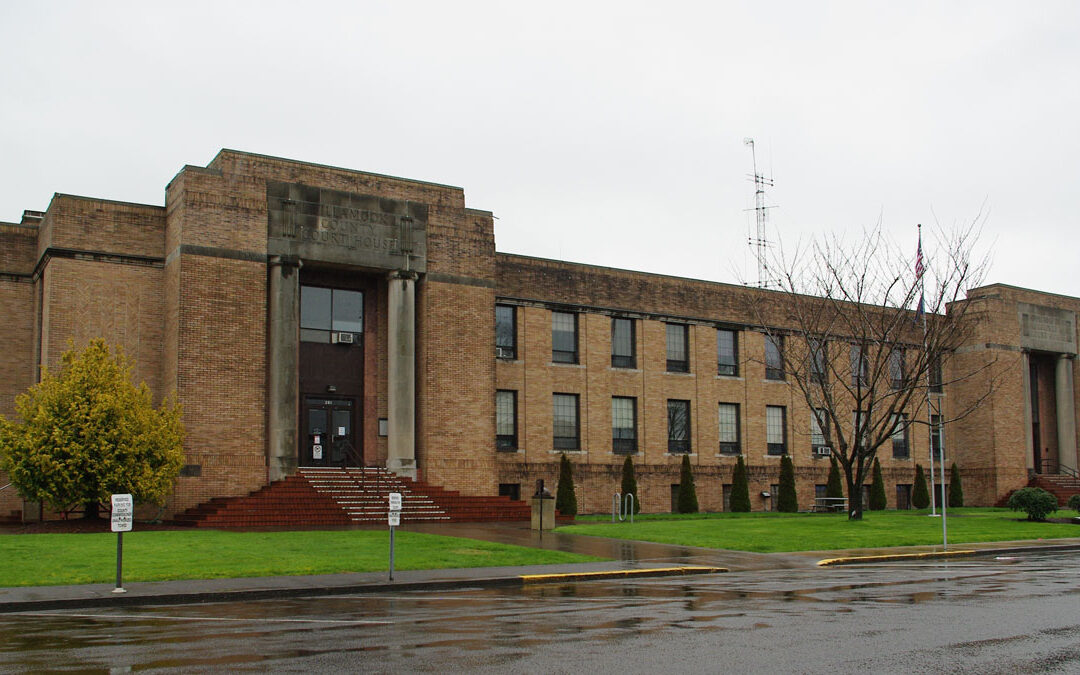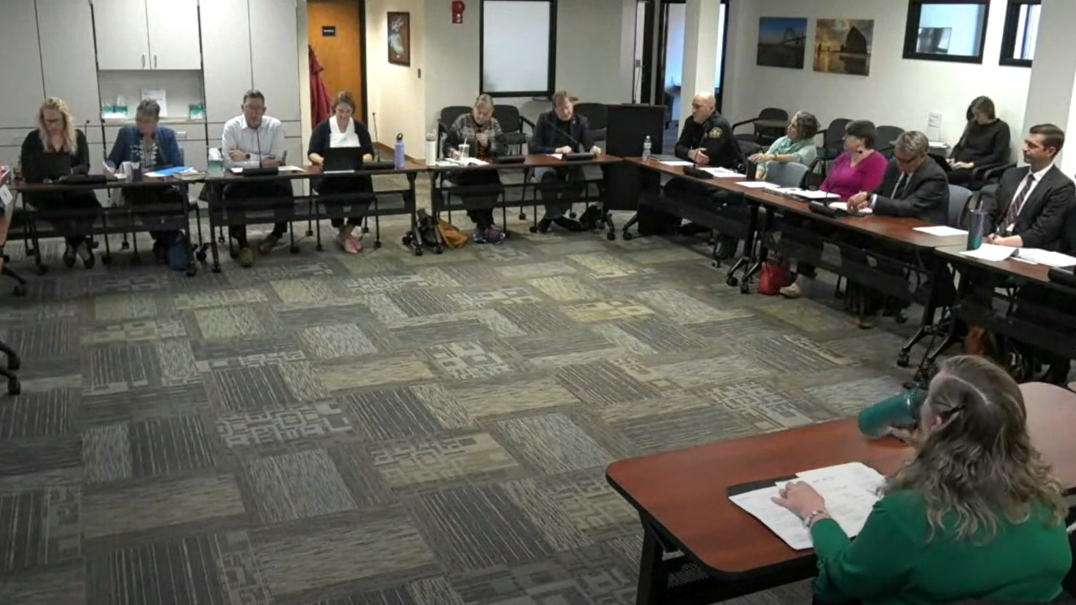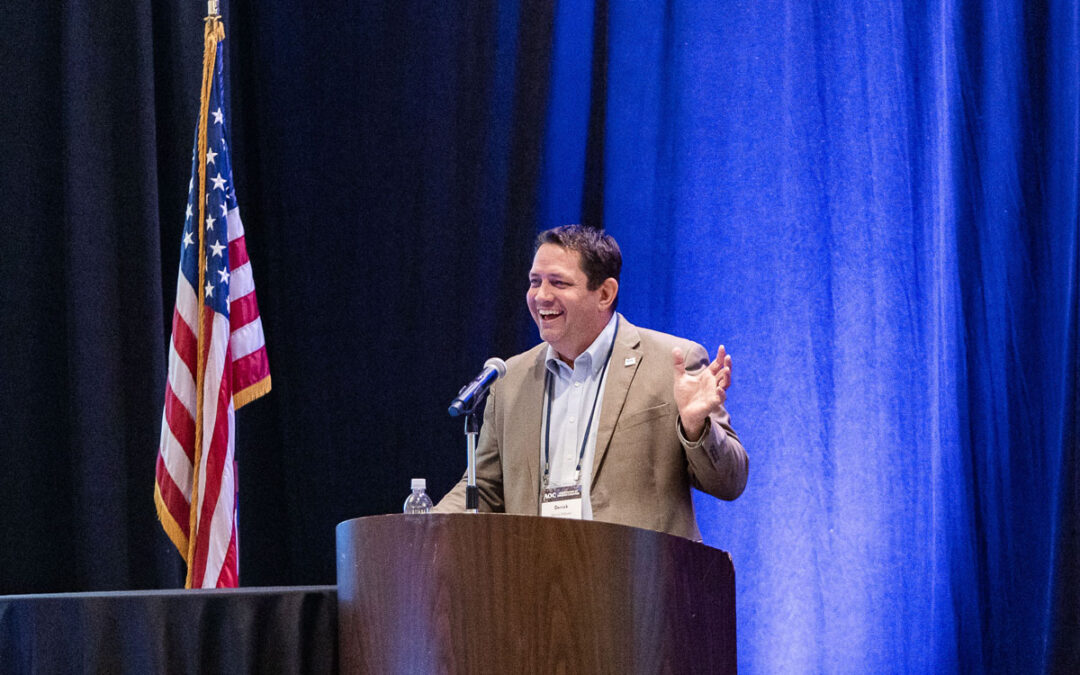
Dec 21, 2023 | AOC Advocacy, Health & Human Services
Oregon counties will be undertaking critical health and human services policy work and partnership development at the Association of Oregon Counties (AOC) in 2024 along three tracks.
Internally, counties are convening monthly at AOC Health and Human Services summit meetings to share and deliberate on local solutions and to develop legislative priorities for local system improvement for the 2025 legislative session. The next summit meeting is scheduled for Monday, Jan. 22, 1 to 4 p.m., at the AOC headquarters in Salem.
To guide AOC’s legislative advocacy in the 2024 short session, our Health and Human Services Steering Committee will meet January through March on AOC Day at 8 a.m., followed by a joint Health and Human Services and Public Safety Steering Committee meeting from 9 to 11 a.m. A stand-alone Public Safety Steering Committee meeting will begin immediately following the joint meeting.
Legislative concepts with potential impacts to county government and programs slated for consideration in the 2024 session include Ballot Measure 110 reforms, local behavioral health system improvements, behavioral health and community corrections gap funding for services to mandated populations, emergency medical services modernization, treatment courts system stabilization, and jail-based medication assisted treatment for opioid addiction.
The Local Government Advisory Committee for Health and Human Services will resume its regular schedule on the fourth Friday at 10 a.m. on Jan. 26, where we look forward to welcoming the new Oregon Health Authority (OHA) Director Dr. Sejal Hathi and discussing how OHA and counties can partner more closely in 2024 on the development of community services funding proposals and legislative advocacy for system improvement.
Contributed by: Jessica Pratt | AOC legislative affairs manager

Dec 21, 2023 | AOC Advocacy, Governance, Revenue, & Economic Development
The biennial Court Facilities Task Force, a collaboration between AOC and the Oregon Judicial Department (OJD) to evaluate and prioritize courthouse improvements and replacements, kicks off in January. Funding requests for projects recommended by the task force will be included in OJD’s 2025 legislative budget proposal, which must be submitted by April 2024.
County officials, commissioners, judges, or chairs representing counties that may want help with courthouse projects in the next few years are strongly encouraged to participate in the task force process. AOC is also actively seeking volunteers to serve as members of the task force. Please reach out to mburdick@oregoncounties.org if you are interested in serving.
A kickoff meeting will be held on Tuesday, Jan. 2. OJD staff will provide background information about the task force, review the status of projects that were prioritized last cycle, and answer your questions.
AOC-OJD Court Facility Task Force Kickoff Meeting
Tuesday, Jan. 2, 2024, 10 a.m. to 2 p.m.
AOC Hood Conference Room (2nd Floor)
1212 Court St NE, Salem Oregon
Or attend virtually: https://meet.google.com/hhj-yfbd-dtr
Or dial: (US) +1 209-862-8182 PIN: 891 906 660#
Two additional task force meetings are planned:
- Thursday, Feb. 1, 10 a.m. to 2 p.m. | Task force reviews county presentations summarizing their proposals, and counties get help identifying any missing information
- Wednesday, March 13, 10 a.m. to 2 p.m. | Final deliberation and prioritization
Counties are understood to be responsible for providing “suitable and sufficient” space for the state circuit court system to operate, as well as maintaining the space and providing security, per ORS 1.185. However, providing space to the state circuit court system is tremendously expensive, and most counties face major challenges upholding their responsibility to keep these buildings in safe conditions, as well as addressing the circuit courts’ growing need for space as populations increase. Many court buildings have historic importance, and their preservation and upkeep are especially expensive. As seismic risk has become better understood and standards have been updated, improvement needs and costs have ballooned even higher.
After the state pre-empted local control over county property tax revenue in the 1990s and strictly limited it via Measure 5 and Measure 50, it has become increasingly impossible for most counties to maintain service levels across all sorts of programs, and court buildings throughout Oregon have become increasingly problematic. The Oregon State Bar highlighted the deteriorating condition of Oregon’s courthouses in a 2006 report, and since then the state legislature has developed some mechanisms to address counties’ challenges with these costs. Grants and matching funds are typically provided every biennium, when the legislature meets in its “long session.” But the needs far outstrip the amount of funding available each session. The task force represents a partnership between OJD and AOC to try to focus limited available state assistance funds on projects that have the most critical need.
The task force began in 2014, when Chief Justice Thomas Balmer asked AOC to conduct outreach to counties and find out about their courthouse improvement and replacement needs, review those requests, and provide him with recommendations about which projects should be prioritized for funding from the legislature. In response, AOC established the Court Facilities Task Force in partnership with OJD, and the partnership has persisted ever since. The process helps prevent counties from lobbying against one another for the same money, so it helps counties work together toward a common purpose.
Some might wonder why providing space to the state’s court system is the responsibility of counties. The arrangement is a vestige of times long past. Before Oregon became a state, counties managed a multitude of functions, including judicial ones, which the state later took over. Benton County built a courthouse in 1854, five years before statehood. Oregon’s judicial system has seen many reforms since then; the last major reforms were enacted in 1981. Until a more thorough solution is available, AOC will continue working with OJD to help the legislature understand the state circuit court’s unmet needs when it comes to safe, suitable buildings, and help counties in their efforts to get those needs met.
Contributed by: Michael Burdick | AOC legislative affairs manager

Dec 19, 2023 | AOC Advocacy, Health & Human Services, Legislative Committee, Public Safety & Veterans
The short 35-day 2024 legislative session is expected to focus primarily on housing and Measure 110. AOC recognizes that some proposals under consideration related to Measure 110 reforms will have direct impacts on counties, and consequently our members are deeply invested in the potential outcomes. AOC is committed to elevating the county voice in these discussions and ensuring that AOC members are able to review and weigh in on concepts with direct county impacts.
In preparation for those conversations, AOC steering committees and the Legislative Committee took action at their October meetings.
AOC’s Public Safety steering committee adopted a 2024 legislative priority related to Measure 110:
- Elevate the county voice in Measure 110 reform, supporting policy modifications that prioritize engagement in substance abuse treatment, provide sufficient funding for county services, and strengthen tools the criminal justice system can use to fight illegal drug use and sales.
AOC’s Health and Human Services steering committee also adopted this principle:
- Support Measure 110 reforms to create a sustainable complete continuum of substance use disorder prevention, treatment and recovery capacity that matches community need and is subject to the statutory planning and oversight of local mental health authorities.
Joint AOC Health and Human Services and Public Safety Steering Committee Meetings
AOC leadership recognizes the importance of the Measure 110 reform conversations to our members, and in collaboratively evaluating both the health and public safety policy considerations. Accordingly, during the 2024 legislative session, AOC’s Health and Human Services and Public Safety steering committees will be meeting jointly to determine AOC positions on relevant 2024 legislative bills. The four co-chairs of these two committees will also meet together routinely to collaborate and direct staff.
On Oct. 27, AOC held a joint Health and Human Services and Public Safety steering committee meeting focused on Ballot Measure 110. The meeting, with over 90 individuals participating in person and virtually, focused on current data, local government perspectives and potential policy changes in the coming year. A variety of partner groups and advocates joined the meeting to share their experiences and thoughts on the future of Measure 110. A full recording of the meeting is linked here.
In the Capitol
Oregon’s legislative leadership created a new joint committee to consider Measure 110-related changes for the 2024 legislative session. The Joint Interim Committee on Addiction and Community Safety Response is co-chaired by Senator Kate Lieber and Representative Jason Kropf. The committee has now met three times. At its October meeting, the committee focused on behavioral health and addiction services. At its November meeting, the committee heard from the law enforcement community on potential policies. A coalition of public safety stakeholders shared with the committee an 11-point proposal.
At its December meeting, the joint committee heard from experts on: evidence-based substance use disorder treatment; medication assisted treatment; and deflection, stabilization and alternative intervention programs. At this 4-hour long meeting, the committee also heard public testimony for the first time. Invited to provide testimony, AOC staff shared with the committee AOC’s adopted priorities and principles on Measure 110 reform, encouraging the committee to consider holistic changes with appropriate systematic funding for county services. AOC further advocated for counties to continue to be invited to the table and included in reform discussions to ensure counties can partner successfully with the state on any future changes. You can watch a full recording of the hearing here.
We expect the next meeting of the joint committee to take place during January Legislative Days.
AOC is actively engaged with legislative leaders and local system partners to discuss the ramifications of potential policy decisions, ensuring that any potential policy change is examined for county impact.
Want to join the conversation?
AOC members interested in shaping the organization’s positions on 2024 legislation affecting Oregon counties are encouraged to participate in January and February steering committees. The schedule can be found on our website.
Contributed by: Jen Lewis-Goff and Jessica Pratt | legislative affairs managers

Dec 18, 2023 | AOC Business Partner
A new platform called Citizenly will bring constituents and elected officials or political candidates together in a positive way. The platform, which has launched in Oregon, is designed to improve the experience of being a citizen and public servant. We’re hopeful that county officials in Oregon will be willing to try out this early version at citizenly.com and let us know how we can improve the platform to meet your, and your constituents’, needs before we expand nationwide.
Here’s why Citizenly was started and how it’s meant to help government officials, candidates, and members of the public.
Citizenly was created because the internet, for all of the good it’s done, hasn’t necessarily improved the experience of being a citizen or public servant. In fact, the internet has arguably made it worse or harder in some ways. If you are a county official, you may have experienced it firsthand: anonymous Facebook users questioning your motives, X (Twitter) users replying to your post with personal attacks, or messages that may be from bots or non-constituents. These toxic interactions have, especially over the last few years, reduced trust locally and nationally. And it’s probably dissuaded some people from public service.
Additionally, members of the public find it difficult to know who represents them at all levels — from federal through state and county down to cities, school boards, and special districts. Simply put, nowhere before has all of this information existed in one place and been well-organized and easily accessible.
Our goal at Citizenly is to change all of that by creating a single place where citizens can go to get information and where public servants can interact with constituents in a way that welcomes discourse and disagreement, but constructively.
Here’s how it works now, in our “beta” phase, and how we envision it developing in the future. Again, we’d love for county officials in Oregon to sign up and help us find ways to improve it before it expands nationally!
In our first release, any resident of Oregon can sign up for free and immediately see all of their elected officials and candidates, along with key information about each. If you are an elected official or candidate, you can also sign up for free and check your profile.
We’re also really proud to have compiled the world’s first and most complete database of every elected official and political candidate in the country, from the President to school boards and special district officials. Our goal for all states is for our data to always be 99%+ complete and 99%+ accurate at any one time — a standard we’ve already met and exceeded in Oregon. (We’ve aggregated all of this information from public sources and don’t distribute any private information.)
So, what’s our vision for Citizenly, and what’s to come? In the months ahead, we’ll be steadily iterating Citizenly to be a little like a mashup of LinkedIn and NextDoor: where those platforms connect users based on professional network or neighborhood, we’ll connect users based on jurisdiction or constituency, as well as political or policy issues of common interest. As an elected official or candidate, you’ll be able to “claim” your profile and update key fields, like your photo and information about you and your role. We’ll offer various outreach and compliance tools, such as surveys for the former and records retention and public meetings notices for the latter. Underneath it all, as a county official, you’ll be able to see whether the person you are interacting with is actually a constituent or not. We’ll be working hard to balance freedom of expression with a prohibition against personal attacks and clearly false statements. In short, Citizenly is intended to be a one-stop shop for sharing and obtaining reliable information, and interacting with others based on constituency or shared policy interests. It’s also meant to be an inclusive place that welcomes people across the political spectrum.
But first things first. We’re really excited about this early version of the platform; however, like any early version, we know that there will be some things we didn’t anticipate or didn’t fully think through. We’d be enormously grateful to any county official in Oregon who signs up (it’s free) at citizenly.com. We welcome feedback from constituents and everyday users as well.
Thanks to Oregon’s county officials for your service and thank you in advance for giving Citizenly a try.
John Horton is the founder and CEO of Citizenly. Prior to founding Citizenly, he worked at the county, state, and federal levels, first as a deputy district attorney in Multnomah County, then as legal counsel to the Oregon House Judiciary Committee, and later as a White House aide. He subsequently founded an Oregon-based technology company, LegitScript, where he served as CEO and Chairman for 15 years. Citizenly is headquartered in the Portland, Oregon, area and has approximately a dozen employees. Citizenly is not a partisan organization, and its employees’ political views span the political spectrum.
*Sponsored content provided by AOC Business Partner Citizenly

Dec 7, 2023 | AOC News
“Get work done,” was Klamath County Commissioner DeGroot’s objective as AOC president this year.
AOC’s commitment to achieving results and addressing county issues was apparent at the 118th AOC Annual Conference as commissioners, judges, county staff, and agency leaders from around the state came to Lane County for three days of networking, learning, and building relationships to solve county issues.
“The conference reflected the work of the association this year,” said DeGroot, “where we refined processes that put us on a path to find common ground and work out our differences to move the association together.”
Over 500 attendees registered for some part of the conference, held Nov. 11-14, at the Graduate Eugene. Presenters discussed finding solutions to problems affecting Oregon counties, rural and urban, large and small. Session topics ranged from preventing wildfires and cyberattacks to addressing the opioid crisis and homelessness.
The event included a preconference for first-year commissioners, judges, and chairs who participated in the 2023 County College program. The half-day session provided an opportunity for reflection on their first year in office and to hear from educational speakers on public meeting laws, partner engagement, and RFP best practices.
Acknowledging differences and how they can strengthen relationships was also the focus of both general sessions. Oregon State Representatives Mark Owens (R-Crane) and Ken Helm (D-Beaverton) discussed how they have found success working across the aisle and together with local governments to craft and pass complex, meaningful legislation on issues that impact all of Oregon.
Brian Miller, a magician turned motivational speaker, provided a unique and engaging experience for attendees during the general session. By incorporating magic tricks, Miller emphasized the importance of perspective-taking and making connections.
Lincoln County Commissioner Casey Miller thought the conference was a great opportunity to challenge his assumptions and learn from others. “I feel like AOC is really nailing it with articulate legislative and steering policy principles,” he said. “Finding our unity amidst our diversity with a collaborative mindset is how I also want to approach governance at home.”
A new addition to the conference was a celebration of AOC’s partner program. The program has grown exponentially in the last few years, with over 60 partners joining the partner program this year. To recognize the program’s success, a membership committee and partner appreciation dinner was held during the conference as a celebration of counties and the partners that support local government in successfully serving their communities.
The last full day of conference concluded with officer elections and the county product tasting. The 2024 AOC Executive Officers who were installed during the annual business meeting are President Danielle Bethell (Marion), First Vice President John Shafer (Umatilla), Second Vice President Erin Skaar (Tillamook), Treasurer James Williams (Lake), and Immediate Past President Derrick DeGroot (Klamath).
The must-attend event was again the county product tasting, where twenty-three counties showcased unique products representative of local agriculture and businesses. Attendees enjoyed sampling seafood from Lincoln County, fry bread and salmon from Jefferson County, ice cream from Wasco County, and much more.
The annual conference also included remarks from Governor Tina Kotek, a virtual Q&A with Senators Jeff Merkley and Ron Wyden, and ample networking opportunities, including an agency partner meet and greet and meetings with federal delegation staff.
“This time together provided us with an opportunity to connect with each other, talk through potential disagreements, find out where we are aligned, and really try to problem solve on behalf of our communities,” said Executive Director Gina Nikkel. “We look forward to working with President Bethell and all our members next year to support counties and their communities.”
Contributed by: Erin Good | Communications Coordinator

Dec 5, 2023 | AOC News
The Association of Oregon Counties (AOC) has hired Malea Stockton as Member Services and Education Coordinator.
Stockton joins AOC with a strong background in nonprofit administrative management and will be a valuable member of the organization. She brings extensive experience in event planning, accounting, and donor relations, most recently serving as chief administrative officer for a mental health nonprofit organization.
Stockton will support the member services and education department, planning events and supporting education programming and the partner program.
“I am pleased to welcome Malea to the AOC team and am confident her unique skills and experience will elevate our member services and contribute to the continued success of the partner program,” said AOC Executive Director Gina Nikkel.
Stockton’s first day was Dec. 1, 2023.
Contributed by: Erin Good | Communications Coordinator

Oct 31, 2023 | AOC Advocacy
On Oct. 12, 2023, three people who lost their homes to foreclosure over unpaid property taxes filed a lawsuit against the counties that foreclosed on them in the U.S. District Court for the District of Oregon. The lawsuit demands refunds of any proceeds of foreclosure sales that exceeded plaintiffs’ debts to Lane, Multnomah, and Yamhill counties, and pertains to sales that took place as far back as May 25, 2017. It seeks to be recognized as a class action on behalf of all similarly situated former homeowners. Counties have been anticipating lawsuits like this one ever since news broke of the U.S. Supreme Court decision, Tyler v. Hennepin County.
On May 25, 2023, the high court ruled that a 94-year-old woman should have received a refund from Hennepin County, Minnesota after they foreclosed on her condo over $17,300 in unpaid property tax, interest, and penalties, and sold it for $40,000. Minnesota is among 14 states, including Oregon, where the foreclosure process provides for the delinquent property being forfeited in its entirety. Under Oregon law, counties retained the proceeds of foreclosure sales, even if the proceeds exceed the taxes, interest, and penalties that were owed. The State of Oregon had filed a “friend of the court” brief in the case, defending Hennepin County against the suit. The ruling held that such processes violate the Takings Clause of the Fifth Amendment to the U.S. Constitution.
AOC expects that soon every county in Oregon will be targeted by similar lawsuits over foreclosure sales, including sales that may have taken place many years ago. Preliminary discussions with CIS, who provides insurance to most Oregon counties, indicate that none of these losses are likely to be covered by insurance. Considering how tight county budgets are, fears are growing over how counties can possibly afford obligations associated with the lawsuits without making catastrophic cuts to critical services such as libraries, policing, and public health programs, or even going bankrupt. AOC is working with counties now to develop an estimate of county legal liability statewide, and are seeking state funding to assist counties with these costs.
Counties in many other states have already seen similar lawsuits. Last year, Oakland County, Michigan settled a similar case for $38 million, and this spring, forty-three other Michigan counties agreed to settle a similar lawsuit, in an agreement estimated to cost tens of millions of dollars.
Getting state help with these costs was identified by AOC membership as our top priority for the 2024 legislative session in the governance and revenue portfolio, along with limiting liability around future foreclosure sales surpluses and establishing new statewide guidelines for how to handle foreclosures. Most states have laws setting reasonable time limits for filing a claim over foreclosure surpluses, which helps counties avoid surprise claims impacting already-budgeted funds – Oregon does not.
There are some steps counties can take by themselves to limit liability associated with future foreclosure sales, but for every one of Oregon’s 36 counties to develop and enact their own ordinance will be a costly exercise, and having a patchwork of varying approaches across Oregon doesn’t make any sense.
At their September meeting, the AOC Governance and Revenue Steering Committee convened a workgroup to develop a legislative proposal for 2024 that addresses these issues. A group of about a dozen county staff who have legal or property management expertise met on Sept. 18, with Marion County Assistant Legal Counsel Scott Norris leading the group in efforts to craft a draft proposal. AOC is working hard to secure introduction of the proposal as a bill for consideration in the 2024 legislative session.
Contributed by: Michael Burdick | AOC legislative affairs manager
Oct 27, 2023 | Events
Online registration closes Monday, Oct. 30, for AOC’s Annual Conference, held in Lane County, Nov. 14-16. The annual conference draws together a cross section of elected officials, county staff, partners, and other participants for educational opportunities, leadership development, and networking. Attendees from rural and urban counties, large and small, participate in the three-day event aimed at improving residents’ lives and the efficiency of county government.
AOC President and Klamath County Commissioner Derrick DeGroot played an integral part in developing this year’s educational programming and finding ways to unite county officials and connect throughout the event. “My focus as AOC president during the 2023 legislative session was to improve the status of counties in the state capitol,” said DeGroot. “Spending six months in Salem reaffirmed my belief that building meaningful relationships is critical to strengthening the state-county partnership and achieving policy solutions that result in efficient and effective delivery of services to the public.”
Concurrent sessions will cover topics ranging from preventing wildfires and cyberattacks to exploring solutions for homelessness, the opioid epidemic, and the mental health crisis.
Also during the conference, Oregon’s U.S. Senators Wyden and Merkley will both step off of the Senate floor for a “couch session” live from Washington D.C., and Brian Miller, a magician turned international speaker on human connection, perspectives, and understanding, will talk on “Connecting with Purpose: How to Magically Connect with Anyone.”
“AOC’s Annual Conference has continued to provide education and networking opportunities for counties for over a century,” commented AOC Executive Director Gina Firman Nikkel, Ph.D. “This unique gathering offers commissioners, judges, chairs, county staff, and partners across the state to come together and explore innovative solutions to county issues, learn from their peers, and develop key relationships. I look forward to this year’s programming lineup which will focus on preventing and solving the top issues that impact counties.”
Online registration closes Monday, Oct. 30.
Please register before Oct. 30, to secure the reduced rate. After Oct. 30, prices will go up, and registration will have to be done on site. Find registration fees and more information on AOC’s conference webpage.
Contributed by: Erin Good | Communications Coordinator

Oct 24, 2023 | AOC Advocacy, Public Safety & Veterans
Many Oregon counties are currently facing a funding shortage for community corrections, reflective of state budgetary allocations not meeting current needs. At its October meeting, the Association of Oregon Counties (AOC) Public Safety Steering Committee adopted a 2024 legislative priority advocating for additional one-time funds ($16 million) for community corrections for the remainder of the biennium. These funds are critical to assist counties in maintaining current service levels until a larger conversation and effort can be taken to review and adjust the overall community corrections funding formula.
In 1995, the Oregon State Legislature passed Senate Bill 1145, establishing community corrections as a state-county partnership to provide supervision and services to certain offender populations. Through the partnership with the state, counties are reimbursed for individuals in their custody sentenced to 12 or fewer months of incarceration, and individuals on probation, parole, or post-prison supervision. The reimbursement rate to counties is based on a complex formula that considers among other factors: populations, case load forecasting, and risk assessments. A cost study is conducted every six years to inform the reimbursement rate. The latest cost study was conducted in 2018.
Oregon legislators received briefings on this issue in the House and Senate Judiciary Committees, as well as in the Joint Ways and Means Public Safety Subcommittee during September legislative days. The Oregon Association of Community Corrections Directors (OACCD) educated lawmakers on the shifting populations being served by community corrections due to a variety of factors such as the COVID-19 pandemic, a public defender shortage, and Ballot Measure 110. The presentation also shared concerns that the funding formula was based largely on a point-in-time cost study, without considering inflation or population risk level costs above average. OACCD discussed funding challenges over the last few budget cycles based on this formula. Washington and Lane counties presented firsthand accounts on how the capacity required to serve the community corrections population continues to become increasingly more complex.
Rep. Kropf, House Judiciary Committee Chair, gave legislative blessings for a Department of Corrections facilitated workgroup to begin stakeholder discussions on the current community corrections funding formula with an eye toward the 2025 legislative budget. AOC was allocated three seats on this committee: one staff member and two commissioners. President DeGroot appointed AOC Public Safety Steering Committee Co-chairs, Commissioner Dave Henslee (Klamath) and Commissioner Jeremy Gordon (Polk) to represent AOC on this workgroup. The county perspective will also be shared via workgroup seats allocated to the OACCD.
“Community corrections is a key public safety tool in our communities,” says Commissioner Gordon. “We urge the Oregon Legislature to allocate additional one-time funds to county community corrections for the remainder of this biennium.”
“Looking ahead to future biennia, our steering committee looks forward to thoughtfully collaborating with our community corrections directors, the Oregon Department of Corrections, Oregon legislators, and other partners, as we dive into this complicated formula discussion,” adds Commissioner Henslee.
Contributed by: Jen Lewis-Goff | AOC Legislative Affairs Manager

Oct 24, 2023 | AOC Advocacy, Transportation
The Association of Oregon Counties (AOC) and League of Oregon Cities (LOC) continued the virtual forum series to coordinate, collaborate, and cultivate a shared understanding of local government interests in Oregon’s transportation funding system.
In August, the first forum meeting provided a detailed overview of federal, state, and local funding mechanisms and how these revenue tools work together to fund the current system. Presentations from the Oregon Department of Transportation, AOC County Road Program, and LOC reviewed the current system, with an emphasis on structural deficits and declining fuel tax revenues. A recording is available here.
The second forum meeting, held on Monday, Oct. 2, featured presentations from two city and two county road departments that demonstrated the range of local jurisdiction transportation budgets and varied regional project priorities. A productive brainstorm and strategy discussion followed the presentations. Slides are available here and a recording of the meeting can be found on the League of Oregon Cities YouTube page.
Forum meetings will continue next year to identify priorities and develop guiding principles to inform AOC and LOC engagement in an expected transportation funding package during the 2025 legislative session. Forum conversations will seek to increase transparent, partnership-oriented communication with state agencies, commissions, and the legislature related to transportation funding policy.
Future forum meetings will feature insight from national experts, and an exploration of mechanisms such as congestion pricing and tolling, road usage or vehicle miles traveled fees, and local options.
Contributed by: Mallorie Roberts | AOC Legislative Affairs Director









